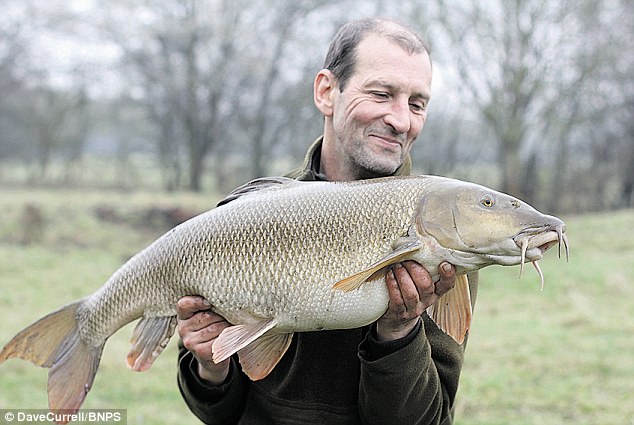- Barbel fish Big Lady was killed by otters on the River Ivel in Bedfordshire
- One marauding otter was seen tearing its throat and partially eating it
- The fish, weighing over 20lbs, was the largest barbel living in UK waters
- Anglers are calling for crackdown on otters, whose numbers are booming
The fish, nicknamed Big Lady, was seen being dragged from the River Ivel in Bedfordshire by a marauding otter, which tore out its throat and partially ate it.
The record specimen weighed more than 20lbs and was believed to be the largest living barbel fish in UK waters.

Big Lady, Britain’s largest barbel fish being held by angler Dave Currell.
The fish has now been killed by an otter, who tore out its throat and partially ate it
Six other large coarse fish have also fallen victim to the otters, which are carnivourous and ferocious hunters, in the same stretch of river in the past three months.
Otters were only re-introduced back on to Britsh waterways in the 1980s after they were on the brink of extinction.
But as they have no natural predator, they are said to be booming in numbers and are picking off expensive, cumbersome fish like carp and barbel, putting fisheries and businesses in jeopardy.
Now, Graham Palmer, the secretary of the Ivel Protection Agency, is calling for fishery bailiffs to be allowed to humanely trap offending otters so they can be moved away from waters stocked with expensive fish.
Mr Palmer said: ‘We have lost our huge barbel, the Big Lady. One of our bailiffs saw it happen. The fish was dragged up the bank with its throat missing and eaten alive.
Anglers are now calling for a crackdown on ‘marauding otters’, who they say are picking off expensive barbel and carp, putting some fisheries out of business
‘Barbel are the most revered sporting fish. They are known as the Prince of the River and are sleek and have a reputation for being fighting machine.
‘In the last three months we have probably lost barbel over 14lbs. It is definitely down to otters.
‘We know they have been here before but we have coped with it but there is one that is almost a resident here and has acquired a taste for barbel.
‘They might have this image of being a nice, fluffy creature but they are also a sleek killing machine, a bit like mink.
‘There is a place for otters in our countryside but there is also no danger of them becoming extinct, they are everywhere in southern England.’
Several fisheries have gone out of business in recent years saying their fish stocks have been decimated by otter predation.
Mr Palmer added: ‘Organisations like Natural England can’t just wash their hands of this.
‘We don’t want people taking the law into their own hands and go around killing otters like a gamekeeper.
‘We need to be permitted to humanely catch otters in traps and be able to move them to different areas.’
In 2013, fishery owner Brian Dodson unsuccessfully tried to sue the Environment Agency after he lost £250,000 worth of fish to the furry mammals after an otter haven was set up nearby.
In recent years a prized 50lbs-plus carp worth about £8,000 was killed in an otter attack along with the country’s previous biggest barbel, known as The Traveller, which weighed a huge 21lbs.
Martin Salter, the campaigns officer for the Angling Trust, said the British waterways were now out-of-balance due to the booming population of otters.
He explained: ‘Otter predation is a serious issue, especially in small rivers where there are large but vulnerable fish like barbel.
‘The natural balance is out of kilter in some areas and the situation hasn’t been helped by ill-advised otter releases by well meaning but naive people.’
However, a spokeman for the Environment Agency defended otters, saying they help maintain a healthy eco-system.
The River Ivel in Bedfordshire, where Big Lady was killed by an otter. Anglers want ishery bailiffs to be allowed to humanely trap offending otters so they can be moved away from waters stocked with expensive fish
He said: ‘The Environment Agency does not see the return of the otter as a cause for alarm or a major threat to fish numbers.
‘If you look at rivers that never lost otters like in Scotland, they have healthy fish populations containing a good age range of fish. It has not resulted in fish being ‘wiped out.’
‘Large specimen fish tend to dominate rivers, which is not a healthy state for a river. You need diversity in age, not just big fish. This wouldn’t have occurred in the past when otters were more numerous and would have eaten some of the larger fish.
‘Specimen fish aren’t immortal. As much as anglers love to fish for large barbel, and even given them names, sooner or later they will die from disease, in a flood event or be eaten by an otter or other predator.
‘Otters also eat ‘pest’ species such as the signal crayfish, an invasive species that has caused a crash in numbers of our native white-clawed crayfish.’
Otters are one of the most protected animals in Europe. Under the Wildlife and Countryside Act it is an offence to kill one or interfere with their habitat and is punishable by a £5,000 fine or six months in prison.
Leave a Reply
You must be logged in to post a comment.